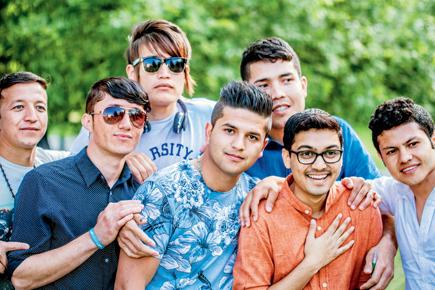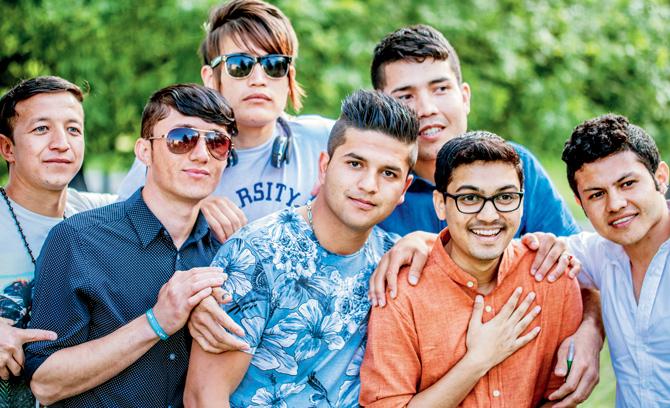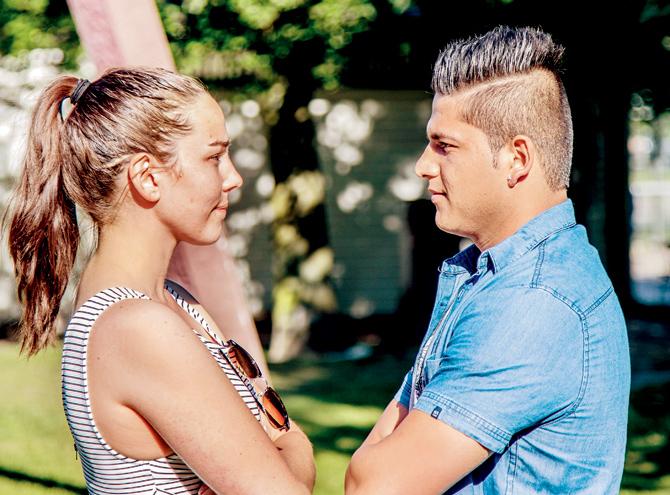A crowd-funded project by an Indian aims to bring home lessons from the lives of Syrian refugees in Europe

Deepak Ramola (in orange T-shirt) with Syrian refugees in Gothemburg, Sweden. PICs/Vibhor Yadav
ADVERTISEMENT
Last week, life coach Deepak Ramola, 24, conducted an activity with Syrian refugees and Swedish citizens in Gothemburg, in the hope of starting a conversation between two distinctly different groups.

Deepak Ramola (in orange T-shirt) with Syrian refugees in Gothemburg, Sweden. Pics/Vibhor Yadav
The founder of Project FUEL (Forward the Understanding of Every Life Lesson), which was started in 2009, to collect real life lessons and turn them into interactive and performance-driven activities, tried a unique exercise. He tied overhand knots in multiple ropes and told participants to select a knot and stand on either side of it. Now the challenge for the group was to untie all the knots without anyone letting go of the ropes. "Clearly, some were uncomfortable with the game.
An uptight Swede gentlemen refused to mingle. But for this task, he was forced to step out of his comfort zone and speak to fellow participants, most of whom were Syrian refugees," says the 24-year-old. Lesson learnt: It takes one person to make things complicated, but a tribe to resolve it. "Therefore, we all must make ourselves accessible to others at all times," he adds.

The staring game encourages people to look into the eyes of refugees
His next stop, to collect "learnings" from people affected by the recent migrant crisis, is Amsterdam. Ramola crowd-funded the campaign on the Wishberry platform, where he put up a post explaining his intention to document the lives and stories of people affected by the migrant crisis in Europe through a documentary, photo-book and workshops.
The virtual world rewarded him with a Rs 30 lakh donation.
"The lessons are passed on by way of workshops, seminars, and sometimes, even over coffee. At FUEL, life lessons are collected, documented, pondered over and turned into performance activities. This way, you don’t learn about someone’s lesson, but experience it, and practically apply it in your own life," says Ramola, a gold medallist in Mass Media Studies.
Ramola currently works as a script analyst for a production house in Mumbai and continues to conduct theatre workshops for NGOs, school and college students all across India.
The point of the activities, says Apoorva Bakshi, business head of FUEL, is to highlight the problem of integration, assimilation and access. "The fact that the refugees are being offered asylum is noteworthy, but they need to be given access to resources. For instance, they are given free SIM cards, but the data charges are too expensive."
In the next 100 days, Ramola, along with four team members, will visit Netherlands, Germany, France and Hungary. "We want to highlight the human side of the refugee crisis, and not portray them as victims. Not all of them are as traumatised," he says. Ramola gives us the instance of a youth from Aleppo, who hailed from a rich family. "His solution to most problems was to buy a high-end phone. Now in Sweden, he has realised the value of each penny."
Through the project, Ramola hopes to bring about a difference in the lives of refugees. "Being a youth member of the
United Nations, I will submit the findings to the body. To make a difference in the life of four million refugees, we have to begin with one."
 Subscribe today by clicking the link and stay updated with the latest news!" Click here!
Subscribe today by clicking the link and stay updated with the latest news!" Click here!







